Indianapolis Rear-End Collision Lawyer
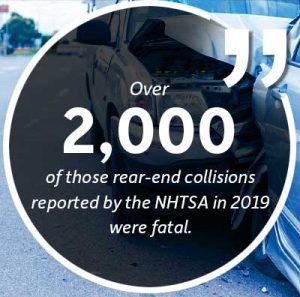
The National Highway Traffic Safety Administration reported over 2 million rear-end collisions in 2019, with nearly 600,000 involving injuries and over 2,000 being fatal.
Though other types of Indianapolis car accidents may tend to result in more injuries and fatalities, the injuries sustained from a rear-end collision vary widely.
Car accidents and resulting injuries can range from minor fender benders to tragic fatalities.
At Crossen Law Firm, our team of experienced Indianapolis car accident attorneys is dedicated to advocating for those injured in Indiana car accidents.
You should always work with an experienced Indianapolis rear-end collision lawyer to ensure you receive adequate financial compensation and hold the guilty party accountable for their negligent actions.
If you have been injured in a rear-end collision, contact a Crossen experienced car accident lawyer today at (317) 401-8626.
The Dangers of Rear-End Accidents
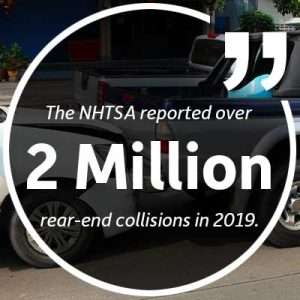
Additionally, drivers have little to no time to prepare for or react before impact, making it harder to maneuver out of the way to lessen the damage.
Because the main point of impact is at the rear of the vehicle, the injuries are not always life-threatening, but they can still be severe.
Neck, back, spine, and head injuries can all still occur due to the force of the impact, causing your body to jerk and fling forward.
Recovery can be long and challenging, depending on the extent of your injuries, property damage, and the emotional toll serious car accidents take.
Crossen Law Firm is dedicated to getting injured victims the compensation they need for their pain and suffering. Call Crossen Law Firm for a free legal consultation at (317) 401-8626 or contact our firm online.
What Are Indiana’s Laws for Determining Liability in Car Accident Cases?
Indiana follows comparative fault laws, meaning a severe rear-end accident victim can receive compensation for damages based on the percentage of fault of the drivers involved in rear-end crashes.
If another party is entirely at fault, they (or their own insurance company) will be responsible for paying the total compensation amount to the victim.
However, if the person who was hit is also partially to blame for the rear-end accident, for example, 10% at fault, their compensation will be reduced by 10%.
Proving who was at fault can get tricky. Often with rear-end collisions, the person who was hit will blame the car behind them, and the car behind them will try to blame the driver in front.
It’s not uncommon for arguments over fault to occur in these situations. For this reason, it’s crucial to work with an experienced attorney.
What Types of Evidence Will I Need to Prove My Case?
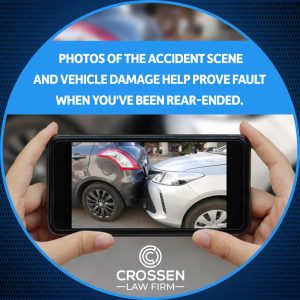
Proof that your car accident attorney will collect can include:
- Photos of the accident scene
- Photos of the vehicle damage
- Photos of your injuries
- Police accident reports
- Insurance company name and policy information
- Witness statements
- Video surveillance
- Medical documents or doctor testimonies proving the extent of injuries.
At Crossen Law Firm, we have experience in personal injury claims, cases fighting against insurers, and helping determine fault to ensure our clients are awarded damages to cover all necessary costs.
Damages Awarded to Indianapolis Rear-End Collision Victims
Let’s take a look at some of the potential damages you can claim compensation for if you’ve been injured in a rear-end car crash.
While medical bills, expenses, and loss of wages are often what victims worry about the most, there are other damages you can receive compensation for, including:
Current and Future Medical Expenses: Compensation for the costs associated with medical treatment, including hospital costs, surgeries, medications, and rehabilitation services, incurred due to the accident (your health insurance company may refuse to pay these costs).
- Rehabilitation Expenses: Costs associated with rehabilitation services such as physical therapy, occupational therapy, or vocational rehabilitation to aid recovery and regain functionality.
- Home Care Expenses: Compensation for hiring caregivers or home health aides to assist with daily activities if the victim requires ongoing care due to their injuries.
- Medical Travel Expenses: Reimbursement for travel-related costs incurred due to medical treatment, such as transportation to and from medical appointments or accommodations for out-of-town medical care.
- Lost Wages: Reimbursement for income lost due to missed work days or reduced earning capacity caused by the injuries sustained in the accident.
- Pain and Suffering: Damages awarded for the physical and emotional distress experienced as a result of the accident, including pain, discomfort, anxiety, and emotional anguish.
- Emotional Distress: Compensation for the psychological impact of the accident, such as anxiety, depression, post-traumatic stress disorder (PTSD), and other emotional injuries.
- Property Damage: Reimbursement for the repair or replacement costs of damaged property, including vehicles, personal belongings, or other assets damaged in the accident.
- Permanent Disfigurement: Compensation for any lasting physical scars, deformities, or disfigurements resulting from the accident, which may affect the victim’s appearance and self-esteem.
- Permanent Disability: Damages awarded for long-term or permanent impairments that affect the victim’s ability to perform daily activities, work, or enjoy life as they did before the accident.
- Loss of Consortium: Damages awarded to a spouse or family member for the loss of companionship, affection, or intimacy resulting from the victim’s injuries.
- Wrongful Death: Damages awarded to the surviving family members or beneficiaries of a deceased victim in cases where the car accident resulted in loss of life, covering funeral expenses, lost financial support, and emotional suffering.
- Loss of Inheritance: Compensation for the financial losses suffered by the victim’s heirs or beneficiaries due to the victim’s premature death in a wrongful death case.
In some cases, car accident victims may even seek compensation for punitive damages. Victims can claim compensation for punitive damages if injuries result from intentional harm and negligent actions.
This could mean they did something intentionally to cause the automobile accident, or they may have turned a blind eye to something they knew would result in a personal injury lawsuit.
You should inform your Indianapolis car accident lawyer immediately if you suspect a rear-end collision resulted from malicious intent or negligence and an injury occurred.
Common Causes of a Rear-End Car Accident
As rear-end collisions occur when someone else hits you from behind, they typically result from the other car accident driver’s negligence.
While the car that was hit can share some of the responsibility or even be entirely to blame in some cases, these instances are rare, and it is usually the fault of the rear driver.
Several factors can contribute to rear-end collisions, but they most commonly occur due to the following:
Distracted driving: These days, texting and driving is one of the most common reasons someone rear-ends the car in front of them. However, other distractions, such as talking with other passengers, looking down at the radio, or looking in the mirror, can also be blamed.
Tailgating: Following too closely to another car can also easily lead to a car accident if the car in front slams on its brakes.
Impaired and drowsy driving: When someone is under the influence of drugs, alcohol, or even prescription medications, their reaction times are often delayed, which can lead to a collision.
Inclement weather: When the roads are wet and slippery, it’s harder to brake, which can lead to a rear-end collision.
Reckless driving: Improper lane changes, failing to signal, and generally driving without paying close attention can also contribute to rear-end accidents.
Common Physical Injuries Caused by a Rear-End Collision
Injuries that occur as a result of rear-end collisions can range in severity. The higher the speed at which the rear-end crash occurs, the more likely you are to suffer very serious injuries.
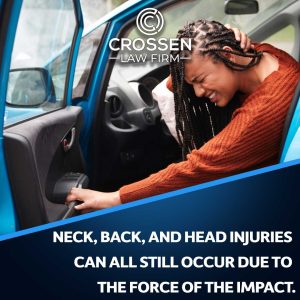
Rear-end collisions often leave the victim with a common injury (or injuries) like:
- Whiplash
- Other neck injuries caused by hitting the steering wheel
- Head injuries
- Traumatic brain injuries (TBI)
- Back injuries
- Spinal cord injuries
- Fractures and broken bones
- Cuts, scrapes, and bruises
- Internal bleeding
Can I Recover Damages From the Other Driver or Their Insurance Company?
The key to your insurance claims and recovering damages is identifying the at-fault rear driver and building a case proving they caused physical, mental, and financial harm.
Here are a few steps your Indianapolis car accident attorneys will take to help you get the legal services and compensation you deserve:
Establishing Fault: The first step in recovering damages is to prove that the rear-end collision resulted from another driver’s actions. In rear-end collisions, the rear driver is typically presumed to be at fault. However, your rear-end collision attorney may identify other contributing factors.
- Proving Negligence: You must demonstrate that the other driver acted negligently or recklessly, leading to the collision. Common examples of negligence in rear-end collisions include distracted driving, tailgating, speeding, impaired driving, or failing to maintain control of the vehicle.
- Seeking Medical Attention: It’s crucial to seek medical attention promptly after a rear-end collision, even if you don’t initially feel injured. Some injuries, such as whiplash or soft tissue injuries, may not manifest symptoms immediately but can worsen over time. Documenting your injuries through medical records and seeking treatment from healthcare professionals strengthen your personal injury claim.
- Documenting Damages: To recover damages, you’ll need to report the full extent of your losses resulting from the rear-end collision. This includes medical expenses (hospital bills, doctor’s visits, medication, rehabilitation expenses), lost wages or income, repair or replacement costs for your vehicle, and non-economic damages.
- Filing an Insurance Claim: In most personal injury cases, you’ll seek compensation by filing a personal injury claim with the at-fault driver’s insurance. Be cautious when communicating with the insurance claims adjuster. Do not accept settlement offers until you consult a personal injury attorney.
- Litigation, if Necessary: If a fair settlement cannot be reached through negotiations with the other driver’s insurance company, your attorney may recommend filing a personal injury lawsuit and pursuing the case in court.
Seeking Help After Indianapolis Rear-End Car Accidents
Immediately following your accident, there are essential steps to establish your personal injury lawsuit claim.
An experienced car accident attorney will guide you through the process and do the heavy lifting so you can focus on recovering from your car accident.
The following are steps you will need to take if you want to build a strong car accident case:
- Seek immediate medical care following the accident. Don’t worry about paperwork or who you should inform. Your health and safety are a priority. Also, medical experts may be called upon to testify if you pursue a claim. Medical evidence of your personal injury will help you win a fair settlement.
- File a police report. As soon as the accident occurs, the authorities should be contacted so they can assist. Be sure it isn’t just emergency medical responders that arrive, but the police as well. This accident report will help support your case, and Indiana law also requires it if there are any injuries, fatalities, or damage to your vehicle
- If possible, collect evidence yourself at the scene. This can include taking photos of your injuries and the car damage and collecting the names of any witnesses present. If you wait too long to contact these individuals, they may not remember what happened as clearly.
- Once you have collected any initial evidence, contact an Indianapolis car accident lawyer to have your case reviewed. They will use any initial evidence collected in addition to helping you obtain further evidence to prove liability. Your attorney will walk you through the process to help you understand your rights and give you the legal support you need to win your case.
- Most importantly, consult your Indianapolis car accident lawyer before giving statements, signing, or agreeing to anything. Insurers may contact you asking for statements, often using this information to turn the tables against you. The typical insurance company and its insurance adjusters are notorious for fighting claims to mitigate their costs.

Hire an Indianapolis Rear-End Collision Lawyer

At Crossen Law Firm, our legal team will fight tirelessly on your behalf to help you get what you are owed. You’ll pay nothing upfront because we work on a contingency fee basis. That means you only pay us if we win your case.
Our personal injury lawyers are committed to getting victims the compensation they deserve. Call Crossen Law Firm for a free legal consultation at (317) 401-8626 or contact our firm online.

-
“Trevor was courteous, professional, fair, and an excellent communicator throughout our entire interaction! Would highly recommend.”
- Hussain -
“What a relief it was that we had someone like Trevor Crossen on our side. Everyone in the office were very pleasant and helpful. We would have been lost if not for him. This is a group that you need to be there when you have to fight for what is right. Automobile accidents are hard enough on you without having to have someone see you through all the paperwork and legal issues. There is no one else I would trust to take us through than Crossen Law Firm they are the best!”
- Bob Taylor -
“Mr. Trevor Crossen has been sìuch a blessing. I was so lost when we first met. He took great care to make sure that I was treated with dignity, he walked me through the whole process from beginning to the end. I had no idea what to expect but he took the time to explain everything and made sure I was treated the way I should be. I would highly recommend Trevor to anyone. The others in the office were so kind and helpful. If you want someone truly on your side Trevor Crossen is the man you need. Thank you all for being there for me.”
- Denise Taylor -
“I honestly don’t know where to start! Trevor is an exceptionable person, he honestly cares for those he works with and his clients! He has completely changed my mind of how lawyers act! He is a man of integrity and I, especially today on thanksgiving, am thankful I chose his law firm to represent me! I highly recommend that you choose Crossen law firm!! Thank you Trevor for all that you’ve done for me and continue to do!”
- Ben Steiner -
“Trevor and His Team Were a "True Guiding Light" for MY Family & I During a Very Difficult and Emotional Time in Our Lives! Thank You Team Crossen”
- Joe A

Why Crossen Law Firm?
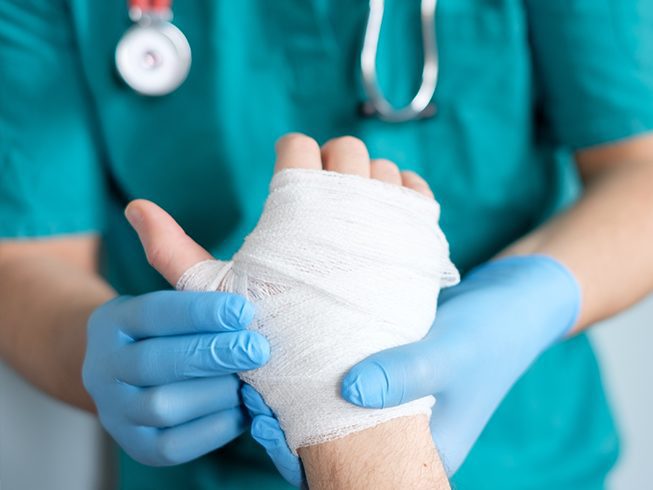
Call our office today at (317) 401-8626 to discuss your case.

 317-401-8626
317-401-8626 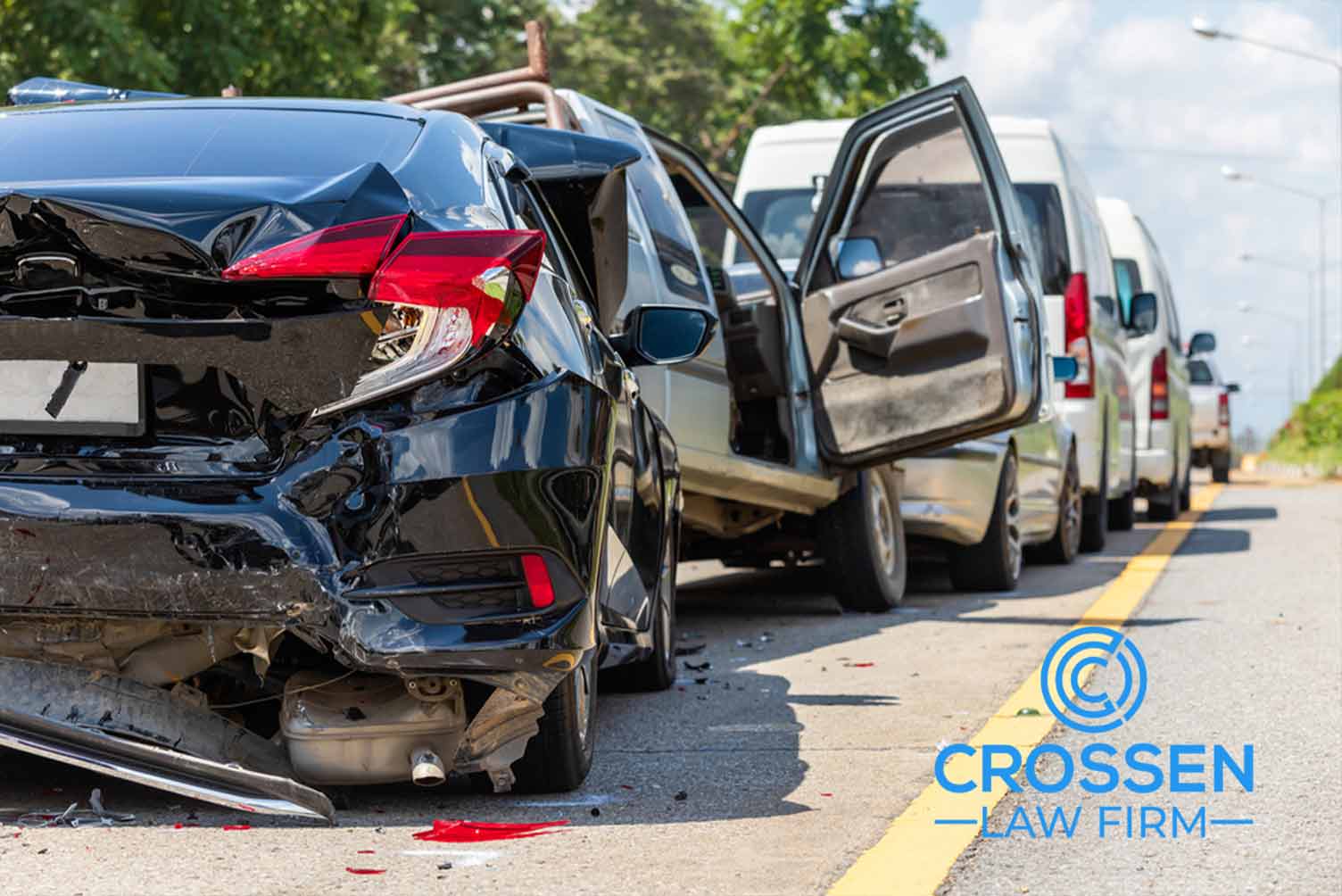
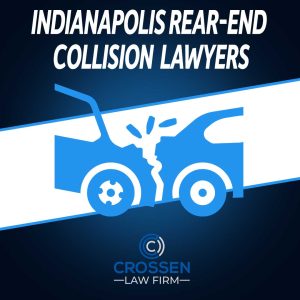 Current and Future Medical Expenses:
Current and Future Medical Expenses: 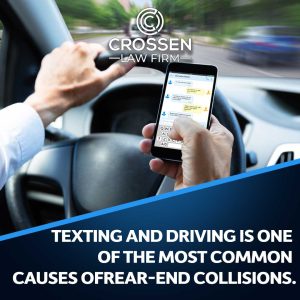
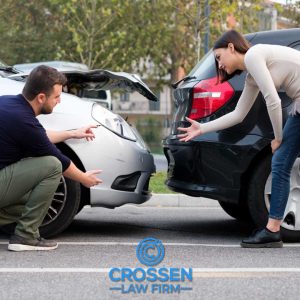 Establishing Fault
Establishing Fault